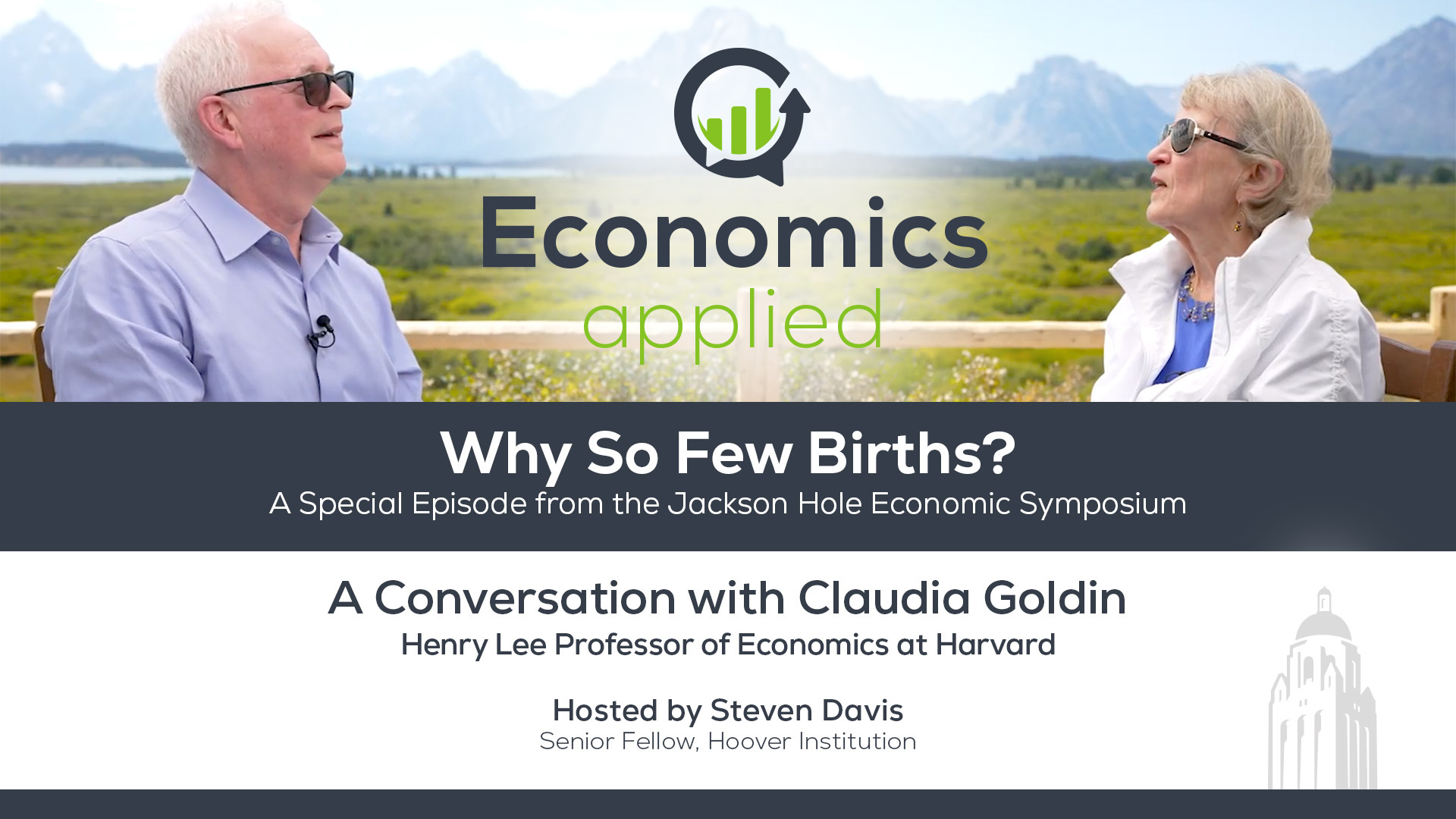- Economics
- Answering Challenges to Advanced Economies
Claudia Goldin joins Steven Davis to discuss the “The Downside of Fertility,” her essay presented at the 2025 Jackson Hole Economic Policy Symposium. She offers an explanation for why fertility rates fell around the world as women gained greater agency in multiple domains (marriage, reproduction, education, labor markets). When women gain agency, Goldin argues that a “mismatch” between men and women in their expectations about child-rearing responsibilities leads to lower fertility. She also argues that this form of mismatch is more acute in the wake of sustained, rapid economic development, as women pursue newfound opportunities while many men cling to traditional views about marriage and child rearing.
>> Steven J. Davis: Welcome to a special edition of Economics Applied at Jackson Lake Lodge. I'm here with Claudia Goldin at the Jackson Hole Monetary Policy Symposium hosted by the Federal Reserve Bank of Kansas City. Claudia is the Henry Lee professor of Economics at Harvard and a 2023 Nobel laureate in Economics, credited with having advanced our understanding of women's labor market outcomes.
She's past president of the American Economic Association, past president of the Economic History Association, and for more than 25 years, director of the NDR's program on the Development of the American Economy. Welcome, Claudia. It's a delight to have you here and have a chance to speak to you.
>> Claudia Goldin: Same here.
>> Steven J. Davis: And we've got the beautiful Teton Mountain range as our backdrop.
>> Steven J. Davis: Earlier today, at this symposium that I mentioned, you delivered a paper titled The Downsides of Fertility. And as you point out, low and declining fertility are actually a pervasive phenomenon across countries around the world in recent decades.
But you know that, some people hold that, but many other people might not know that. So maybe you could just start out to set the stage for our discussion by giving us the broad contours of what's happened to fertility in recent decades, perhaps with a little extra attention to the United States.
>> Claudia Goldin: So, by fertility, we generally measure it as a concept called the total fertility rate. I'd much rather use its cousin, the cohort fertility rate. But that means that we have to have completed fertility for various cohorts. So we use something which is the cross section version. It's as if every woman will have the fertility of every woman at a particular age in cross-section.
The total fertility rate is low in most countries today, almost all countries. However, for relatively rich countries like the United States, it's been low for an incredibly long period of time, about 50 years. So we had long ago a baby boom. I am the product of the baby boom.
Not the only one, of course.
>> Steven J. Davis: I'm at the end of the baby boom.
>> Claudia Goldin: Okay. And after the baby boom, fertility went down to about two. It went a little bit lower than that. It came up a little bit higher, then went a little bit lower, and it has stayed about that rate.
It's now a little bit lower than that. It's about 1.6 something. Some things depend upon the composition of the population. When we have more new immigrant groups, we have higher fertility. We've had somewhat lower immigrant new immigrant groups. In fact, Hispanics have had declining fertility in the US for the past-
>> Steven J. Davis: The Hispanic is starting to converge the fertility rate.
>> Claudia Goldin: Absolutely, that's right.
>> Steven J. Davis: Of other Americans.
>> Claudia Goldin: That's right. But most importantly, almost all rich countries, almost all OECD countries are way below 2, which is, quote, the replacement rate. About 2.1 is the replacement rate.
>> Steven J. Davis: Right.
>> Claudia Goldin: And in addition, there are just very few relatively rich countries.
OECD countries, almost all of them are below. Israel is one of the few that's relatively higher. But it isn't just rich countries. Brazil's total fertility rate is equal to the U.S. the Colombia's is about equal. Mexico's is just a little bit higher. There are very, very few countries in which it isn't low.
And then there are the countries in which it's relatively high, but it's really declining even in Sub Saharan Africa. So the bottom line here is twofold. Number one, fertility declined in much of the world is declining in the rest of the world, and that just isn't that new.
And it's below replacement in most places and almost below replacement in the entire world.
>> Steven J. Davis: Right. Okay, so it really is a pervasive phenomenon, and it's been going on for quite some time.
>> Claudia Goldin: In rich countries.
>> Steven J. Davis: In rich countries, but it's been going on very dramatically more in more recent decades in poorer countries.
>> Claudia Goldin: That's right. And even in the UAE, the UAE has fertility as low as baby scarce Japan, which is pretty amazing.
>> Steven J. Davis: Pretty amazing.
>> Claudia Goldin: Saudi Arabia is maybe around 2.2 now. Something like that.
>> Steven J. Davis: Okay, so in your paper, you lay out, you sketch some of these facts.
They've been sketched out before, but you sketch out, you emphasize a few countries which we may come back to, but you make the observation that looks, the pervasive nature of this phenomenon suggests that common forces are at work. That's not to deny the potential role of country specific factors.
It's not to deny the possibility that these common forces work out with somewhat different intensity in different countries. But it kind of begs for a common explanation.
>> Claudia Goldin: Right, and in addition, because this has been going on for so long, why are we talking about it now?
>> Steven J. Davis: Well, let me come back to that one.
I think I might have slightly different views than you on that one. So let's get to your preferred explanation for this pervasive phenomenon which has been going on for a long time. So give me your basic take on why this is happening.
>> Claudia Goldin: Well, the fact is that in almost all of these countries, all that I have studied, women have been given autonomy, independence, the ability to control their own fertility, by and large, the ability to get more education, in fact, a lot more education, the ability to have good jobs and careers, the ability to give to whatever children they have, the best of this world.
And that is probably what many would like to do.
>> Steven J. Davis: Okay, so increased agency for women, and here I'm using your term from the paper with respect to fertility, their reproductive outcomes, with respect to education, with respect to the prospects for career in the labor market, and with respect, also, you emphasized this in your response.
It's a little different. Their ability to provide for their children in the way that they think is is essential for those children to thrive and grow well.
>> Claudia Goldin: And the problem is that you can't do all of them at once by yourself.
>> Steven J. Davis: Okay, so, yeah, maybe that's an obvious point, but that's a good one to make explicit.
So if you want to get higher education, if you want to get a good start on a demanding career, you call them greedy jobs. In some of your work, your early twenties, your mid twenties, maybe even well into your early thirties is a really crucial time. I got that right?
>> Claudia Goldin: Probably, yeah.
>> Steven J. Davis: Okay.
>> Claudia Goldin: Well, you have to do it sometime.
>> Steven J. Davis: You have to do it-
>> Claudia Goldin: And you also have to have kids at some time.
>> Steven J. Davis: You have to have kids at some time and fertility of women declines pretty sharply starting after sometime at 30.
>> Claudia Goldin: Somewhat controversial. We'll leave that out.
>> Steven J. Davis: We'll leave that part out, just, okay, it declines, so we-
>> Claudia Goldin: It declines.
>> Steven J. Davis: It declines over time. Okay, so there's this, I guess, how would you say it? Pressure to accomplish many things at once. If you want a lot of education, you want to pursue a demanding career, you want to have children, you want to have a happy, successful marriage.
>> Claudia Goldin: Yeah, but it's also simply an investment issue. So I have a choice that I've never had before. Let's say I'm a woman who is in Korea. My parents, my grandparents were in rural areas. They didn't have choices. I now live in Seoul. I have a choice. I can invest in my education and I can reap returns.
But can I also have a child? I can only do that if I have a spouse. Let's call it a husband who's gonna do it with me. And if that spouse has a low probability of actually committing and actually doing it, then I might think twice about getting the education.
I might think twice after I get the education about having the child.
>> Steven J. Davis: Okay, so there's the increased agency part, that's the choice to pursue an education.
>> Claudia Goldin: The increased agency is that I'm different from my parents, my grandparents.
>> Steven J. Davis: But then you're saying, look, if you want to actually combine all these things and say the first 35 years of your life as a woman, you need or would definitely benefit from having a man, a husband who has a cooperative outlook with respect to the sharing of household responsibilities, especially child care.
Do I have that right?
>> Claudia Goldin: That's right. Because you cannot outsource everything having to do with children. And if you did outsource it, you'd have to ask, why did I have the kids?
>> Steven J. Davis: Right. Okay, I'm sympathetic to that. Some things you can outsource, but some things involving your children are hard to outsource.
Okay, but then you didn't put these two together yet to explain why it is so many women find themselves, and men too. And it's not just women, obviously it's two. Why so many young people delay marriage, delay fertility, or don't have kids at all.
>> Claudia Goldin: Okay, well, the first one is pretty simple, because we said that the woman has agency.
She can decide to have more education. More education will lead her to delay having kids or getting married for lots of different reasons. We needn't go through those. But she then has to decide. In this world of men, some of them are going to after having the kid, some of them are going to do what they had originally promised, take care of the kid, and some maybe didn't promise it or aren't going to do it.
And depending upon how large that probability is, let's call it P, she will then get an education and have a child, knowing that she can reap the returns from the education and have a child, maybe two or three kids, and they will all have happy lives that are well supported.
If instead that probability is really, really low, then she has to make a decision. I either have the kids or I have the education. That's a starker world. And in many ways, certain countries, Korea may be one in which there has become a starker world. And in my work in economic history, women who went to college from around, who graduated college around 1900-1920, 50% of them never had a child, 30% of the total never got married.
That was clearly a group for whom it was career or family. And it may be that in certain places of the world, right now we're moving more in that direction.
>> Steven J. Davis: Okay, so I want to probe the. I guess it's partly about the determinants of P as you describe it.
So in your paper you make a claim, and I'm going to push back a little bit on it. First, I'll state the claim. You tell me if I got it wrong, that men have a lot to gain by sticking through traditional ways and not adapting to this increased agency of women.
So I think that's a premise only.
>> Claudia Goldin: In certain places in which traditions are much closer to home. So in countries which have undergone really rampant economic growth, in which individual families have moved in large numbers from rural areas to urban areas, in which families that were poor now have children who are educated and rich, in those countries, traditions change much more slowly than do technologies and the economies.
In countries like the US and Sweden and France and Britain, Denmark, et cetera, those places have had more. They've had rapid rates of growth, but they've had more continuous rates of growth. And therefore there hasn't been the same clash of generations and genders. So therefore, in those places, it may be that those P's are low, but they're not low because of this other clash.
>> Steven J. Davis: Okay, but so let me just put on the table a few things and get your reaction to them. One is that there is an advantage to men in kind of moving away from the traditional division of responsibilities in the household between men and women. There's the disadvantage, which I think is men spent much less time than women historically in raising children in the household and now they're asked to do more.
So that's more work for the man. On the other hand, as you know very well, the relative earnings of women have increased a lot. Both because their wages have risen relative to men and because their hours and their employment rates have risen relative to men. So the income pooling benefit to men of forming a common household, which usually takes the, often depending on the society will take the form of marriage.
Those benefits have gone up a lot for many.
>> Claudia Goldin: Yeah.
>> Steven J. Davis: So you would expect men to also say, you know what, yeah, maybe in one respect marriage is a little bit, requires a little bit more of me, but in another respect it's a better deal because I share more from my partner's income and there's a little bit more pooling of income related risks.
But it looks like, if I understand the evidence correctly in your reading of the evidence in particular, that seems to be a very slow working process-
>> Claudia Goldin: Well, a couple of things. It may be a fast working process, but there is the issue of greedy jobs. So if there are greedy jobs, and that means that putting a lot more time into them and not really having enough time to take off to take the kid to a dentist appointment or to take your sick father to an orthopedic appointment, if.
There are greedy jobs in which taking that time off is a game changer. Then one of the traditions is that men take the greedy jobs and women take the non greedy jobs. I mean, we just know that there is a. What we call, and I hate the name, we call it a child penalty or motherhead penalty.
I hate that name.
>> Steven J. Davis: Yeah, I don't like it either.
>> Claudia Goldin: But in fact-
>> Steven J. Davis: It's what's taken root.
>> Claudia Goldin: It's what's taken root. And so all we know is that women, on average, even the most educated, the ones with the highest degrees, the ones who are the smartest in the family.
>> Steven J. Davis: Right.
>> Claudia Goldin: Are the ones who take the hit. And so some of that is doing more often.
>> Steven J. Davis: Speaking of averages.
>> Claudia Goldin: That's right. There are lots and lots of cases we know more and more in which women make more than men. And in fact, what I've been exploring now in data, the usual data that we use is how many men are actually stay at home dads.
It's small, but it's growing a little bit more, right? And of course, we have the ability to outsource some part of this.
>> Steven J. Davis: Right.
>> Claudia Goldin: So you're absolutely right that there should be more pressure for women to be able to in some sense, be what they should be, which are the, you know, high flyers that men have always been or at least have the careers have the jobs that are satisfying to them, okay?
And we know, in the US we wouldn't have a total fertility rate of, it was around 1.7, it's a little bit. We wouldn't have that if that weren't the case. It's not a chorea of 0.75, 0.8, okay?
>> Steven J. Davis: Right, I understand. But so let me come at this, I'm still puzzled by both one feature of the data-
>> Claudia Goldin: And you know what, I am happy that you're puzzled because if you're puzzled, I would like every man to be puzzled, okay?
>> Steven J. Davis: Let me drill into one part that's puzzling to me. And that's the, you call them Group 1 countries in your paper. It includes the United States.
It's basically the set of rich countries you referred to earlier that had more continuous growth.
>> Claudia Goldin: That's right.
>> Steven J. Davis: Okay, so for that countries and the US Is a bit different, but for many, most of the countries in that group, they've had similar fertility rates for about 50 years, if I remember right.
Hasn't really changed much. And I would have instead expected to see that there's this initial tension between traditional values and what their parents grew up with. And then, their cohorts coming into an environment where women have new agency, but eventually there's adjustments. And the P that you referred to earlier, that's probably this key probability in your model, would gradually adjust not within the generation necessarily, but from generation to generation.
>> Claudia Goldin: You're forgetting the fact that in those countries, at different moments, women gained a very, very important agency which they use, which is the agency to control their own fertility, right to marry later, to get more education. Those countries got that and used it sort of in a somewhat slower way.
And that's really what kept fertility down at about 1.8, 1.9 or so.
>> Steven J. Davis: Okay, well, then does that mean you are anticipating some adjustment in social norms in these countries over the next generation or two. And I should be clear what I mean by that, that then there becomes less mismatch, more harmony between the desires and preferences of women and how to share childcare responsibilities in those events.
>> Claudia Goldin: Right.
>> Steven J. Davis: So this tension you've described gets weaker. More women find it optimal, personally to have a child with their husband, and you get fertility rates going up.
>> Claudia Goldin: Yeah, it could be. Okay, let's back up and talk like good Chicago economists.
>> Steven J. Davis: Okay.
>> Claudia Goldin: What I would like more than anything is for every couple to have the number of children they would like to have, given their resources and given the resources provided by their community, their state, the federal government.
That's what I would like. And what I see often, and what this paper is about in particular having to do with certain countries like Korea, Japan, Spain, Portugal, Italy, et cetera, is that it's often the case that there's a lot of mismatch. How much mismatch there is in the US Is sort of less clear.
It's less clear whether we're at an equilibrium here or whether we still have a certain amount of mismatch.
>> Steven J. Davis: Yes. Well, my wife grew up in Korea, mostly in Korea, and I spend time every summer there, and I often ask Koreans and Korean economists included, about. I didn't use the term mismatch, but in Korea, it's kind of widely accepted that this mismatch phenomenon is a major.
I don't see it written down in papers, but you just talk to people, they perceive a tension between what, men and women.
>> Claudia Goldin: Yet they say something else. They say women are selfish.
>> Steven J. Davis: Well, they say that, too but-
>> Claudia Goldin: But that's different from the mismatch. That's a backlash on the part of certain men.
>> Steven J. Davis: It is a backlash on part of certain-
>> Claudia Goldin: And we saw that in the last election.
>> Steven J. Davis: Yeah, but also, this is what I hear from people. They just say, look, women and men don't agree on how the household responsibilities should be divided up and hence that makes them more reluctant to get married and if they do get married, more reluctant to have children.
Now you can, there is this element you talked about. It's a politically sensitive and socially sensitive issue in Korea. But I'm basically agreeing with you that there's some of that. What I'm trying to elicit from you is a sense of whether or not there is a natural slow working adjustments that will reduce this mismatch in countries like Korea and maybe to a lesser extent in the United States or is it just stuck there indefinitely without some external shift?
>> Claudia Goldin: No, I think we can. So, I gave the following, made the following point, that if you live in a world, first of all, if there were dishes in the sink, a lot of people wouldn't wash them, okay? There are some people who for some reason, having to do with their upbringing or their own psyche, decide to wash the dishes.
But most people don't wash the dishes. So my point simply is that it may be that if you're in a community in which everyone washes the dishes, then you pass by the dishes and you think I should wash them. And I think that that's what it is. And in a country like Sweden, which has over a fairly long period of time managed to get men to wash the dishes and women, there may be some women who didn't wash the dishes either.
There's more social opprobrium and it's that if you go to a daycare center in Sweden and there are a lot of them, and of course that's another issue having to do with what the state provides to parents of young children. If you go to a daycare center, men are picking up the children and women are picking up the children Children.
If you go to a daycare center in Cambridge, Massachusetts, where I'm from now, men pick up the children and women pick up the children. We are our own little Sweden.
>> Steven J. Davis: Okay.
>> Claudia Goldin: If you go to other places, it's women who pick up the children, okay?
>> Steven J. Davis: Okay.
>> Claudia Goldin: And it's probably that way in Korea.
>> Steven J. Davis: Okay, so, I'll try one more time, cuz I hear you, I agree. I'm quite sympathetic to the notion that people respond to their social environment and what's expected of them by the others that they associate with. So accept that.
What I'm trying to understand is more the intergenerational dynamic. Is there some natural self correcting force there that will mitigate this mismatch problem over time or, or going to be stuck without some external pressure?
>> Claudia Goldin: So in countries in these Group 1 countries, and the Group 1 countries are countries like the US and the UK, France, that have had more continuous growth over time, probably this self correcting force has already occurred in places like Japan or Korea or Spain or Italy.
One might expect you're absolutely right. And I am somewhat mute on that because I hate to predict the future, which is why I'm having a hard.
>> Steven J. Davis: Time eliciting a response on this one.
>> Claudia Goldin: Which is why I'm an economic historian, and I am even bad at predicting the past.
>> Steven J. Davis: Okay, I hear you, but I-
>> Claudia Goldin: I understand what you're saying, and there should be some self correcting force. However, the self correctingness doesn't seem like it will bring the fertility rate above the 2.1 number that Chad Jones reminded us in some frightening way is going to send us in 250 or 500 years into oblivion.
Whether there is another type of self correcting force having to do with land, whether in, I mean what Chad is talking about, of course, is sort of a Malthusian equilibrium. Will the rabbits disappear or will they keep on reproducing the more land we give them?
>> Steven J. Davis: So there's this Chad Jones commented on your paper at the symposium.
>> Claudia Goldin: Wonderfully commented on the paper.
>> Steven J. Davis: He's thought a lot about-
>> Claudia Goldin: That's right.
>> Steven J. Davis: Not from your angle, but from a very different angle, but it's still interesting to listen to it.
>> Claudia Goldin: Well, I was very, very pleased that they made him the discussion because I wanted someone to discuss that.
>> Steven J. Davis: Yeah, it was an excellent choice. So, okay, but I hear you saying one thing and I'm going to repeat it, but I think you're also saying another thing which you didn't state explicitly, so let me try it. So you're saying even if there's some natural self correction and the fraction of men who are willing to share household responsibilities in a relatively equal way.
That doesn't mean we'll get to this Magic Number of 2.1 Total fertility rate or the replacement rate, so to speak. But it also does not mean that we'll fully resolve the mismatch problem or even get privately optimal outcomes for, say, women and men who want to have a certain number of children.
So we could still have a gap between desired number of children and actual number of children. So I think you're saying both those things.
>> Claudia Goldin: Yeah, and I do not make policy, so I am not certain how to close. And even if I close the gap, let's go one step further.
Let's say I close the gap. The fact that women were given agency at some point in the 20th century, over time, an agency meant that they didn't have to have five births, six births, seven births. Okay, there will still be some fraction of them who want zero.
>> Steven J. Davis: Right.
>> Claudia Goldin: And if some fraction of them want zero and everyone else wants two, then the total fertility rate will be, you know, two minus the fraction that wants zero, and it's going to be under two.
>> Steven J. Davis: Right, yeah, understood. So let me try another. Just a question that I have in my mind, and it's about how much scope there is for technology to mitigate the mismatch problem, absent other changes.
So let me set it up a bit because it's a little more complicated. So the mismatch problem arises because a woman in your model, because a woman doesn't know with confidence whether the man that she's thinking about married, marrying will be the good type. We're gonna share the households, or the dads, as you refer to them in the-
>> Claudia Goldin: The duds or the dads?
>> Steven J. Davis: The duds or the dads. The good dads are the duds. And so there is both the expected value of P, but there's also a risk element to it. So at least for some women, they might be more inclined, especially if they pursue education and a greedy job, it might be more inclined to have a child later, after they've accrued some confidence, that the man is the dad type and not the dud type.
>> Claudia Goldin: There's never any confidence.
>> Steven J. Davis: Never any confidence. You think even if a woman lives with a man for many years, she sees that he washes the dishes, that she-
>> Claudia Goldin: Let's see what happens when the baby arrives.
>> Steven J. Davis: So you don't think there's much scope for-
>> Claudia Goldin: I'm sure we could do this model better and not have Pete just between as the aggregate.
But highly specific, I would have to go along with you, but there's never a complete confidence, right?
>> Steven J. Davis: Sure, of course.
>> Claudia Goldin: I wanna hear a really good technocratic answer.
>> Steven J. Davis: No, well, here I didn't finish my setup. So I don't have a particular view. It just strikes me as an interesting one to think about.
We do know that in the United States and I think in other rich countries, too. But you can correct me that the relative fertility rate of women who are well into their life cycle, say over 40, has gone up. That's partly due to advances in reproductive.
>> Claudia Goldin: I have shown that-
>> Steven J. Davis: Okay, so you have shown that-
>> Claudia Goldin: Personally, but in the book, yeah.
>> Steven J. Davis: Okay, gotcha. So let's take that as a premise, cuz that's well established. What I'm trying to understand is, is there now a lessening of this risk facing some women because they live with a husband for many years and decide, you know, he really probably is a dad 100%.
>> Claudia Goldin: Not only that, but he's gonna change over time, because over time he's gonna say, no, no, no. He's going to say, I really understand the issues of mortality, which I had no idea ever existed when I was 22. And I would like to have a child, and my parents are at the end of their lives, and they would really like to have a grandchild.
And so, that's something that I would like. And yep, I truly believe that the increase in births for women over the ages of late 30s and in their 40s has been due to amazing and important. And in some sense one has to praise the women and the men who've gone through with this, that birth rates have increased because of that.
There's no question whether that is enough. I don't know. As it tries to, let me just tell you something of my own silly life as a very young child. I don't know where I ever got this idea, but as a very young child, I had this notion that when I was an adult there would be artificial wombs.
And I saw absolutely no reason why women should physically bear this very, very difficult burden when they could still go to the artificial womb and love the child and make certain that the child was well taken care of. The fact that that has never evolved to me, and during that period of time, things have evolved that I would never have thought of.
When someone once showed me the notion that you could have a phone in your pocket, my answer was, why would I ever want that?
>> Steven J. Davis: Well, since you told a silly story, I'm gonna tell one about my childhood. I spent a lot of my adolescent years reading science fiction.
This idea does come up in science fiction novels occasionally. And there's one woman author. That's the second thing I want to say. It's a woman. It came up in a series of novels written by a woman. She's world building, imagining in a future society. And all rich households, rich worlds in this advanced civilization have access to what you just described.
But it is interesting that it came up in novels written by women, not novels written by men. So, okay, so let's get into the issue of, you made the point earlier in our conversation and you made it today in your remarks and you make it in the paper.
Well, or you raise the question why so much attention to the fertility question now when the phenomenon is not new, as we discussed, the phenomenon of low fertility rates in rich countries and declining fertility rates pretty much everywhere is not new. So you have some thoughts about that.
>> Claudia Goldin: Right, so I can well understand why Koreans and Japanese are talking about this issue. Because fertility, particularly in Korea, is dropped to incredibly low levels. It's also attached, as we mentioned before, to some macho ness on the part of high ranking officials. Okay, but in the US since this has been going on for an incredibly long period of time, the question is why are we talking about it now?
And I raise some possibilities. One is that if we are in an era, certainly an administration that wants to cut down on immigration, then the increase in the population and the native born population or the population that's here already is one way of Taking care of it. However, anyone who does the math, the simple math, will see that you will increase the dependency rate enormously overnight.
That's going to last for 15, 20 years until you will reap those returns. So one sort of has to factor that in with some appropriate discount rate. Another reason is that it isn't really the fertility rate that they're after, individuals who are touting this and raising it, but it's really family values, religious values, community values.
I'm all for these values. However, I think that one of the reasons that this is being raised now is to compensate for taking away of resources from the federal government and also from various state governments. A third reason that this has come up is because there is a sense on the part of high ranking people, on the part of, even from various surveys that the push to gender egalitarianism for some has just overstepped its bounds.
And my answer to that is if you pull back on that, you'll probably reduce the fertility rate even more.
>> Steven J. Davis: Okay, so I think all of the three things you said is are in play, but I think there at least I see one other big thing in play.
Good, which is it may be hard for you to imagine because you study these issues all the time, but when I just talk to regular folks, I would say until the last four or five years the average person on the street is worried about overpopulation and running out of.
And so the recognition of the reality sets in much more slowly than the reality itself. And I can think even as recently as two years ago, I was at a seminar, I won't say the name, listening to a professor from an Ivy League university speculating about the reasons for fertility decline in the United States and clearly unaware that it was a global phenomenon.
Now this person was not a fertility specialist by any means.
>> Claudia Goldin: Was it a macroeconomist?
>> Steven J. Davis: Wasn't even a macroeconomist. Now, I take your point now, but there's merit in the joke. I take your point. Macroeconomists sometimes get lost in their models and are oblivious to the world.
This wasn't even an economist, okay.
>> Claudia Goldin: I didn't mean that.
>> Steven J. Davis: So I think part of the reason is just very slow recognition among the vast majority of people of the change. The Paul Ehrlich view of how we're gonna doom ourselves and let's still carries a lot of weight.
>> Claudia Goldin: Paul Ehrlich, who wrote the book with his wife, that was 1968, the population bomb in which he said in the 1970s and the 1980s, he said, millions and millions of people will die from famine. And, in fact, that was really the beginnings of a decrease in population growth in much of the world.
>> Steven J. Davis: Right.
>> Claudia Goldin: I think that the person who said that, I don't know if the person was unaware of what was going on. I could hardly believe that this person does not know what's going on in OECD nations. It may be that the fact that the total fertility rate in Nigeria, which is a very, very large country, in Niger, which is a smaller country in Uganda, in Burkina Faso, in much of sub Saharan Africa, has been A above 4, in fact, in many places above 5 or 6, may be that the person was saying there's overpopulation in some parts of the world, even in sub Saharan Africa.
It has begun
>> Steven J. Davis: Interpretation. But I think the, look-
>> Claudia Goldin: Thank you, Will. I like to be generous, even with macroeconomists.
>> Steven J. Davis: Even with macroeconomists. Thank you. I'm sometimes in that tribe. Bu I wanna go back to my basic claim, and it's hard to prove, cuz I don't have any survey evidence or other evidence at hand.
But I think in Cambridge, Massachusetts, in the circles you and I tend to travel in, at least in our professional lives, people are well informed about these things. But I don't think much of the electorate is, it's only quite recently and I'd say the last five years.
>> Claudia Goldin: But don't you think that it's a we and them issue, in Kansas, in the heart of America?
I should say Wyoming, because we're in Wyoming right now. But there aren't that many people here. And everyone who's here is probably from New York or Chicago. They know that fertility rates are lower there. Their church is telling them that they're thinking about Mexico, and they don't know that Mexico's total fatality rate has declined.
I think that's what you should, next time you speak to them, you tell them that Brazil, Mexico, Colombia, way down. Okay. I don't know about Venezuela.
>> Steven J. Davis: Well, I should have gotten some actual survey evidence and came armed with some evidence other than just my conversations with people, cuz it's always dangerous to generalize from anecdotes and personal observations.
>> Claudia Goldin: Well, isn't that what data is?
>> Steven J. Davis: Yeah, but it's usually ideally drawn from a sample frame that is informative, and the set of people I associate with and talk to might not be. All right, Claudia, is there anything else you want to put on the table?
>> Claudia Goldin: As I said before, my main goal in writing this paper, and in fact it was prompted by Christian Lagarde's request to me last year that I make a presentation to the European Central Bank.
And I thought, European central bankers are talking about all sorts of boring things. So I will tell them about population, because after all, everything they're talking about can only exist because of population change.
>> Steven J. Davis: Right.
>> Claudia Goldin: We know that that's very important. So that's where this began. But where it has come round to is my sense from history, my sense from studying many countries or trying to study as many as I can, that there is in some sense a mismatch.
And where we see mismatches, we see room for increased productivity. And that is really my-
>> Steven J. Davis: And in this context, increased productivity mean, bringing people's actual fertility outcomes closer to their desired ones.
>> Claudia Goldin: Closer to their desired ones. And some of it is simply being able to signal better who you are.
We were just talking about that with regard to men. And the other part of it is having communities that support and uplift them.
>> Steven J. Davis: Right, well, this last thing you said, when I read your paper, I was thinking, well, what practical advice would you give someone? And it's really, if you're thinking about marrying somebody, a man or a woman, depending on whether you're a woman or a man, you wanna actually make sure that your preferences and your views, your attitudes around this particular set of issues, especially the childcare, because that's the part that's hardest to outsource.
A lot of other household stuff. If you have high income, you can outsource it. Very hard to outsource key aspects of child care and child development. So you better make sure that you're aligned with your prospective partner or you're going to be in store for a not very happy marriage.
>> Claudia Goldin: That's right. So you can sign a binding contract at the beginning. If you have enough wealth, you can sort of put it up.
>> Steven J. Davis: Right, you put up a bond, so to speak.
>> Claudia Goldin: Yeah.
>> Steven J. Davis: Yes.
>> Claudia Goldin: Okay.
>> Steven J. Davis: All right, it's been a lot of fun.
It's a glitzy market. It's a missing market. Okay, yes. Thanks a lot. It's been a pleasure.
>> Claudia Goldin: Okay, thanks very much, Steve.
ABOUT THE SPEAKERS
Claudia Goldin is the Henry Lee Professor of Economics at Harvard University, where she also holds the Lee and Ezpeleta Professorship of Arts & Sciences. Goldin is past president of the American Economic Association, past president of the American History Association, and former director of the NBER’s program on the Development of the American Economy. She was awarded the 2023 Sveriges Riksbank Prize in Economic Sciences in Memory of Alfred Nobel “for having advanced our understanding of women’s labour market outcomes.”
An economic historian and a labor economist, Goldin's research covers a wide range of topics that include the female labor force, the gender gap in earnings, income inequality, technological change, education, and immigration. Major works include Career & Family: Women's Century-Long Journey toward Equity and The Race between Education and Technology with Lawrence F. Katz.
Steven Davis is the Thomas W. and Susan B. Ford Senior Fellow and Director of Research at the Hoover Institution and Senior Fellow at the Stanford Institute for Economic Policy Research (SIEPR). He is a research associate of the NBER, IZA research fellow, elected fellow of the Society of Labor Economists, and a consultant to the Federal Reserve Bank of Atlanta. He co-founded the Economic Policy Uncertainty project, the U.S. Survey of Working Arrangements and Attitudes, the Global Survey of Working Arrangements, the Survey of Business Uncertainty, and the Stock Market Jumps project. He also co-organizes the Asian Monetary Policy Forum, held annually in Singapore. Before joining Hoover, Davis was on the faculty at the University of Chicago Booth School of Business, serving as both distinguished service professor and deputy dean of the faculty.
RELATED SOURCES
- “The Downside of Fertility” by Claudia Goldin, 2025.
- Claudia Goldin, Official Nobel Prize Interview, 2023.
- The Population Bomb by Paul Ehrlich, 1968
- The Vorkosigan Saga, a series of science fiction novels by Lois McMaster Bujold in which artificial wombs profoundly influence human reproduction and the nature of society.
ABOUT THE SERIES
Each episode of Economics, Applied, a video podcast series, features senior fellow Steven Davis in conversation with leaders and researchers about economic developments and their ramifications. The goal is to bring evidence and economic reasoning to the table, drawing lessons for individuals, organizations, and society. The podcast also aims to showcase the value of individual initiative, markets, the rule of law, and sound policy in fostering prosperity and security.
For more information, visit hoover.org/podcasts/economics-applied.




















